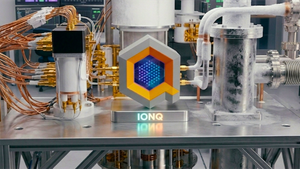- First overall survival (OS) results from Arm A1 of the Phase 2 EDGE-Gastric study will be presented on October 18 at the European Society for Medical Oncology (ESMO) 2025 Congress
- These data support the ongoing development of domvanalimab plus zimberelimab and chemotherapy in the Phase 3 STAR-221 study in the same patient population
Arcus Biosciences, Inc. (NYSE: RCUS), a clinical-stage, global biopharmaceutical company focused on developing differentiated molecules and combination therapies for patients with cancer, today announced the first OS results from Arm A1 of the Phase 2 EDGE-Gastric study in patients with locally advanced unresectable or metastatic gastric, gastroesophageal junction or esophageal adenocarcinoma. The ongoing, multi-arm, global Phase 2 EDGE-Gastric study is evaluating the safety and efficacy of various combinations of the Fc-silent anti-TIGIT antibody domvanalimab plus the anti-PD-1 monoclonal antibody zimberelimab and chemotherapy in this patient population. This study was conducted in partnership with Gilead Sciences. These results will be presented in a mini oral session at the ESMO 2025 Congress (Presentation Number 2112MO).
“It is impressive to see that 50 percent of the patients enrolled in Arm A1 of the EDGE-Gastric study went on to live for more than two years,” said Dr. Sun Young Rha, professor of Medical Oncology in the Department of Internal Medicine and the director of Songdang Institute for Cancer Research, Yonsei University College of Medicine, Yonsei University Health System in Seoul, Korea. “A 26.7-month median overall survival is well beyond what would be required to demonstrate clinically meaningful benefit over standard of care.”
“These survival results add to the totality of data for domvanalimab and the role of anti-TIGIT-based combinations for the treatment of different cancers and reinforce our conviction that an Fc-silent anti-TIGIT antibody may provide differentiated efficacy and safety,” said Richard Markus, M.D., Ph.D., chief medical officer of Arcus. “These promising results reinforce our confidence in the ongoing Phase 3 STAR-221 study.”
In addition to describing OS data, this presentation also includes updated progression-free survival (PFS) and objective response rate (ORR) data, which are consistent with prior reports on this study. At data cutoff (DCO, March 3, 2025), safety and efficacy were evaluated in all patients enrolled and treated (n=41), and median study follow-up was 26.4 months. Efficacy was observed across all PD-L1 subgroups. With a median time on treatment of 49 weeks (range: <1-117 weeks), the domvanalimab plus zimberelimab and chemotherapy regimen demonstrated sustained efficacy with longer follow-up.
Summary of EDGE-Gastric Arm A1 Efficacy Results:
|
Overall* (N = 41) |
PD-L1 Positive (TAP ≥1%) (n = 29) |
PD-L1 High (TAP ≥5%) (n = 16) |
Median OS, months (90% CI) |
26.7 (18.4, NE) |
26.7 (19.5, NE) |
NE (17.4, NE) |
24 months OS rate, % (90% CI) |
50.2 (36.3, 62.6) |
53.8 (37.3, 67.7) |
56.3 (33.9, 73.6) |
Median PFS, months (90% CI) |
12.9 (9.8, 14.6) |
13.2 (11.3, 15.2) |
14.5 (11.3, NE) |
24 months PFS rate, % (90% CI) |
25.9 (14.8, 38.5) |
24.9 (12.1, 39.9) |
31.3 (14.0, 50.2) |
Confirmed ORR, % (n) per RECIST v1.1
|
59% (24)
|
62% (18)
|
69% (11)
|
One patient did not have tissue available for central laboratory TAP scoring (SP263 assay). Local lab results showed the patient was PD-L1 low according to 22C3 assay.
*All pts who enrolled and received study treatment.
|
|||
No unexpected safety signals were observed at the time of data cutoff. The regimen of domvanalimab plus zimberelimab and chemotherapy was generally well tolerated and had a safety profile that is consistent with that of anti-PD-1 plus chemotherapy. Immune-mediated treatment-emergent adverse events related to domvanalimab and/or zimberelimab occurred in 9 patients (22%), and infusion-related reactions occurred in 3 patients (7%).
Domvanalimab and zimberelimab are investigational molecules, and neither Gilead nor Arcus has received approval from any regulatory authority for any use globally, and their safety and efficacy have not been established.
About the EDGE-Gastric Study
The ongoing, multi-arm, multi-cohort global Phase 2 EDGE-Gastric trial (NCT05329766) is evaluating the safety and efficacy of various combinations of the Fc-silent anti-TIGIT antibody domvanalimab and the anti-PD-1 antibody zimberelimab in patients with locally advanced unresectable or metastatic gastric (G), gastroesophageal junction (GEJ) or esophageal (E) adenocarcinoma. Patients in Arm A1, with previously untreated G/GEJ/E adenocarcinoma, received 1600mg of domvanalimab intravenously (IV) every four weeks (Q4W) plus 480mg of zimberelimab IV Q4W + FOLFOX (oxaliplatin 85 mg/m2 IV, leucovorin 400mg/m2 IV, fluorouracil 400mg/m2 IV bolus + 2400mg/m2 continuous 46-48-hour IV infusion) every two weeks.
About the STAR-221 Study
The ongoing, global STAR-221 trial (NCT05568095) enrolled approximately 1,050 participants with locally advanced unresectable or metastatic gastric, gastroesophageal junction, or esophageal adenocarcinoma. The primary endpoints of the study are overall survival in PD-L1-high tumors, PD-L1-positive tumors and in the intent-to-treat population (all PD-L1 levels); secondary endpoints include progression-free survival, objective response rate and duration of response. Participants were randomized 1:1 between two arms:
- 1600mg of domvanalimab intravenously (IV) every four weeks plus 480mg of zimberelimab IV every four weeks plus FOLFOX (oxaliplatin, leucovorin, fluorouracil) every two weeks or 1200mg of domvanalimab plus 360mg of zimberelimab every three weeks plus CAPOX (capecitabine and oxaliplatin) every three weeks
- 240mg of nivolumab IV every two weeks plus FOLFOX every two weeks or 360mg of nivolumab plus CAPOX every three weeks
About Domvanalimab
Domvanalimab is the first and most clinically advanced Fc-silent investigational monoclonal antibody that is specifically designed with Fc-silent properties to block and bind to the T-cell immunoreceptor with Ig and ITIM domains (TIGIT), a checkpoint receptor on immune cells that acts as a brake on the anticancer immune response. By binding to TIGIT with Fc-silent properties, domvanalimab is believed to work by freeing up immune-activating pathways and activate immune cells to attack and kill cancer cells without depleting the peripheral regulatory T cells important in avoiding immune-related toxicity.
Combined inhibition of both TIGIT and programmed cell death protein-1 (PD-1) is believed to significantly enhance immune cell activation, as these checkpoint receptors play distinct, complementary roles in anti-tumor activity. Domvanalimab is being evaluated in combination with anti-PD-1 monoclonal antibodies, including zimberelimab in multiple ongoing and planned early and late-stage clinical studies in various tumor types.
About Zimberelimab
Zimberelimab is an anti-programmed cell death protein-1 (PD-1) monoclonal antibody that binds PD-1, with the goal of restoring the antitumor activity of T cells. Zimberelimab has demonstrated high affinity, selectivity and potency in various tumor types.
Zimberelimab is being evaluated in the U.S. and globally as a foundational anti-PD-1 treatment option in multiple ongoing clinical studies in combination with other immunotherapies. Guangzhou Gloria Biosciences Co. Ltd., which holds commercialization rights for zimberelimab in greater China, has obtained approval for zimberelimab for the treatment of recurrent or metastatic cervical cancer and for relapsed or refractory classical Hodgkin’s lymphoma. Zimberelimab is not approved for any use in the U.S. or other regions outside of China. Gloria conducts its development and commercialization activities independent of Arcus and Gilead.
About Arcus Biosciences
Arcus Biosciences is a clinical-stage, global biopharmaceutical company developing differentiated molecules and combination therapies for people with cancer. In partnership with industry collaborators, patients and physicians around the world, Arcus is expediting the development of first- and/or best-in-class medicines against well-characterized biological targets and pathways and studying novel, biology-driven combinations that have the potential to help people with cancer live longer. Founded in 2015, the company has advanced multiple investigational medicines into registrational clinical trials including domvanalimab, an Fc-silent anti-TIGIT antibody being studied in combination with zimberelimab, an anti-PD-1 antibody, for upper gastrointestinal and non-small cell lung cancer, casdatifan, a HIF-2a inhibitor for clear cell renal cell carcinoma, and quemliclustat, a small-molecule CD73 inhibitor for pancreatic cancer. For more information about Arcus Biosciences’ clinical and preclinical programs, please visit www.arcusbio.com.
Arcus Forward-Looking Statements
This press release contains forward-looking statements. All statements regarding events or results to occur in the future contained herein are forward-looking statements reflecting the current beliefs and expectations of management made pursuant to the safe harbor provisions of the Private Securities Litigation Reform Act of 1995, including, but not limited to, statements on the potential for differentiation with domvanalimab. All forward-looking statements involve known and unknown risks and uncertainties and other important factors that may cause Arcus’s actual results, performance or achievements to differ significantly from those expressed or implied by the forward-looking statements. Factors that could cause or contribute to such differences include, but are not limited to risks associated with: interim data not being replicated in other studies evaluating the same investigational molecules or regimen; the unexpected emergence of adverse events or other undesirable side effects from studies evaluating domvanalimab and/or zimberelimab; Arcus’s ability to complete ongoing studies; and the inherent uncertainty associated with pharmaceutical product development and clinical trials. Risks and uncertainties facing Arcus are described more fully in the “Risk Factors” section of Arcus’s most recent periodic report filed with the U.S. Securities and Exchange Commission. You are cautioned not to place undue reliance on the forward-looking statements, which speak only as of the date of this press release. Arcus disclaims any obligation or undertaking to update, supplement or revise any forward-looking statements contained in this press release except to the extent required by law.
The Arcus name and logo are trademarks of Arcus Biosciences, Inc. All other trademarks belong to their respective owners.
View source version on businesswire.com: https://www.businesswire.com/news/home/20251012443700/en/
Contacts
Investor Inquiries:
Pia Eaves
VP of Investor Relations & Strategy
(617) 459-2006
peaves@arcusbio.com
Media Inquiries:
Holli Kolkey
VP of Corporate Affairs
(650) 922-1269
hkolkey@arcusbio.com
Maryam Bassiri
AD, Corporate Communications
(510) 406-8520
mbassiri@arcusbio.com





